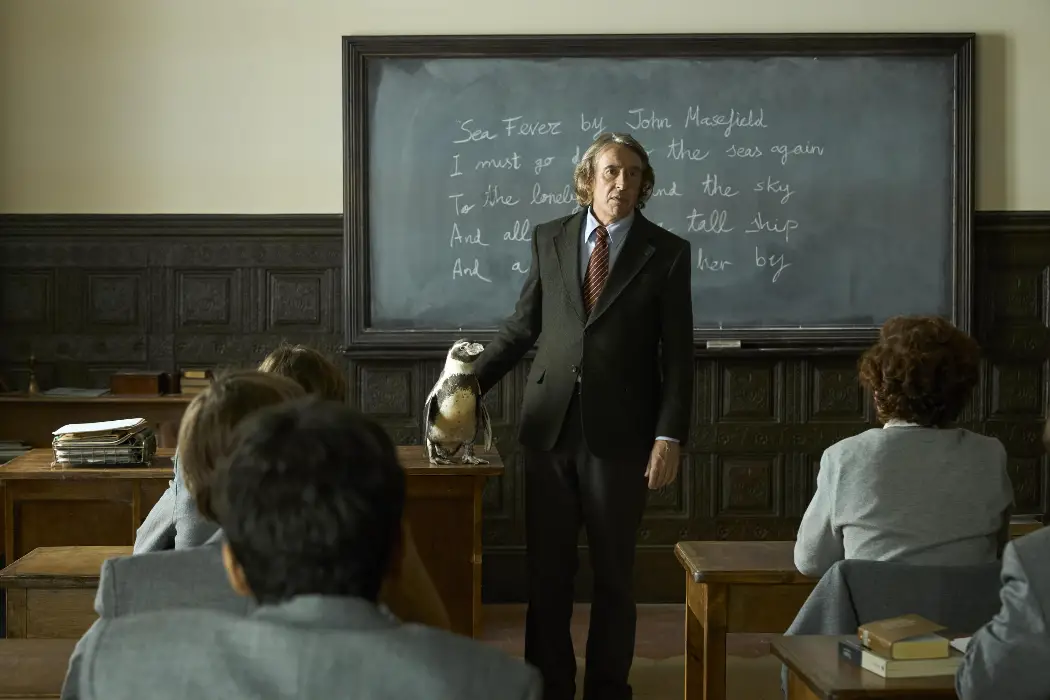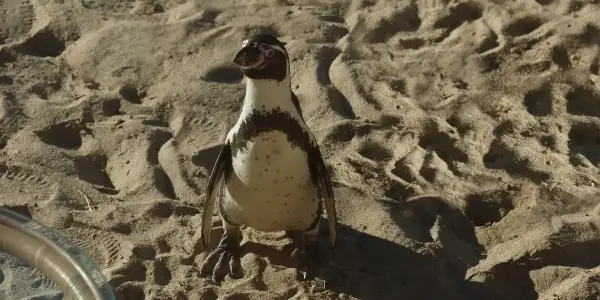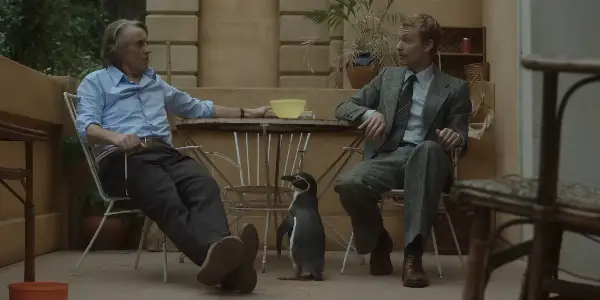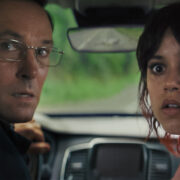THE PENGUIN LESSONS: Steve Coogan And A Penguin Stand Up To Fascism (And It Goes About As Well As You’d Expect)

Film critic, Ithaca College and University of St Andrews graduate,…
It’s official — the United Kingdom has The Penguin Lessons fever. Posters for this thing, depicting Steve Coogan mugging beside a penguin on a bench, are plastered on every bus and in every bus station and cinema lobby. I can’t go to the cinema in Scotland without seeing a trailer for the film, which stars a penguin as a lighthearted cosmic wanderer who arrives unwittingly at a young boys’ school in Argentina in the 1970s. Jonathan Pryce co-stars as the strict headmaster. I’m kidding, of course, about the rapturous reception — the only logical explanation for the overmarketing of a light historical drama that stars Steve Coogan and a penguin is that the U.K. has no other significant national cinema worth promoting. Why it’s been released three weeks early in the U.S. first is anyone’s guess.
The Penguin Lessons is unfortunately exactly what you think it’s going to be, and nothing more. It’s a wobbly entry into the “Dads Who Didn’t Want Pets” subgenre that never fully engages with the history it so recklessly uses as its backdrop. If you have pets of your own, this will probably make you cry, even though it’s a poorly made film about a cynical professor who kidnaps a penguin and brings it to show-and-tell at his little posh school for rich boys.
Just Give The Penguin To A Zoo, Man
When one attempts to seriously evaluate the story of The Penguin Lessons, they will quickly come to regard it as one of our foremost examples of national hubris. Exactly zero people asked for a movie about Argentina’s Dirty Wars told through the perspective of a British professor at an English-language boarding school and his pet penguin — and now that we have one, what are we to do with it? The professor’s story of finding the penguin in an oil slick in Uruguay and adopting him as his own — despite being far from the most qualified person to care for the animal — is as quintessentially British as it gets. The Brits love imagining that they’re the best people for the job, any job, whether that job is caring for a penguin or ruling over the entire country of India.

Let’s not pretend that there wasn’t a zoo in Uruguay that the professor could have handed the penguin over to; and in Argentina, he harasses the local zoo in Buenos Aires until they give him a meeting, and he backs out when he gets jittery about putting the animal in a cage. This is a creature that deserves to be returned to its natural habitat, and at the very least deserves a handler who knows what kind of fish to feed it and how to care for its health and wellbeing. With the professor, the penguin is cooped up in a tiny apartment all day or waddles around a boarding school — far from the ideal habitat for the little creature. The lie at the heart of The Penguin Lessons is that the professor kept this penguin out of some misguided sense of philanthropy or because it “helped him to become a better teacher” or some other nonsense — really, he kept it because he wanted to, and because nobody told him he couldn’t.
Who Asked For This Movie?
Furthermore, why does the most turbulent period in Argentina’s history need to be examined from the perspective of a jaded professor played by Steve Coogan? What value can be gleaned from seeing an English teacher at an all-boys school be mildly inconvenienced by the military junta? The screenplay, by Jeff Pope and based on Tom Michell’s memoir of the same name, never answers that question. Instead, we watch the misadventures of a misanthrope and his penguin pal while, way off in the background, military officials backed by the U.S. overthrow Isabel Perón — one event in a long series of tragedies collectively called the “Dirty Wars.” Countless Argentine citizens were assassinated or massacred, and thousands more were disappeared.

Watching I’m Still Here, a brilliant and recent Brazilian film by Walter Salles about that country’s military dictatorship, I couldn’t help getting hung up on the class politics that I felt went underexplored. This dictatorship affected all of Brazil, yet the characters in I’m Still Here are those with the political power, money, and means to resist — at least, they can always leave Rio de Janiero and move to São Paolo when things get dire. Perspective is everything for a story, especially a political one. And if the perspective is a sore spot for I’m Still Here, it’s like a bullet through the head for The Penguin Lessons. The movie’s cooked as soon as Coogan enters the picture three minutes in, and it never, ever recovers. He never feels of a piece with the history around him.
The Penguin Is The Real Star Of The Film
Worse still, not a single actor in the film — neither the white people nor the Argentines — is as compelling a screen presence as the penguin. Coogan has several scenes where he monologues, boringly, about English poetry. They have nothing to do with the plot and make you desperate to see the penguin again. The best parts of The Penguin Lessons are when the penguin swims, eats fish, bites Steve Coogan, and climbs down some stairs. It adds up to maybe a full minute of compelling cinema.
The problem is that the director, Peter Cattaneo, is telling the wrong story, and he’s telling it quite badly. The star of the picture, unquestionably, is the penguin, yet Cattaneo and editor Robin Peters cut away from it constantly. Usually to reaction shots of the schoolboys or the professor’s colleagues. Granted, if there were all penguin, all the time in The Penguin Lessons, I’m not sure it would have made much of a difference. Cattaneo can show me as many penguins swimming in the pool of St. George’s School for Boys as he wants — it doesn’t change the fact that this doesn’t feel like a story worth telling.

It’s rare that I fundamentally reject the entire concept of a film outright. All films might be art, but not every film is good art. Some of them are a big ol’ pile of penguin guano. Even in the trailers for The Penguin Lesson, you can feel the stinking desperation of the picture to cobble together some kind of pathos for its characters and for that adorable penguin — it has to conspire some way to win over the legions of pensioners who typically go in droves to see stuff like this. The film’s marketing team seems to know that this is an uphill battle, that The Penguin Lessons has no right to tell this story, and that the film is completely and totally ludicrous, utterly doomed to fail, from the very first scene. And yet it soldiers on anyway. It’s truly one of the best modern metaphors we have for British society.
Conclusion
I can only say that I have the utmost sympathy for all involved. Coogan is a wonderful actor in the right role, but just because he can play a charming second fiddle to Judi Dench in Philomena doesn’t mean he’ll have the same chemistry with a Magellanic penguin. As for the director, Cattaneo’s career might have been bright and promising 20 years ago, but here he is now directing The Penguin Lessons. I want to know who watched Robert Carlyle striptease in The Full Monty and said, “This is great, and I’m dying to know what this filmmaker has to say about Argentina’s Dirty Wars.” Maybe he just really wanted to work with Steve Coogan and a penguin — I do, too — but why on Earth did it have to be with this screenplay? I want to believe that British cinema has more to offer than tired star vehicles where the nation’s foremost comedians mug next to various animals. But I also sort of want to see a film in which Richard Ayoade and a meerkat grapple with apartheid.
The Penguin Lessons premieres in the United Kingdom on April 18, 2025, and is currently showing in American theaters.
Does content like this matter to you?
Become a Member and support film journalism. Unlock access to all of Film Inquiry`s great articles. Join a community of like-minded readers who are passionate about cinema - get access to our private members Network, give back to independent filmmakers, and more.
Film critic, Ithaca College and University of St Andrews graduate, head of the "Paddington 2" fan club.













